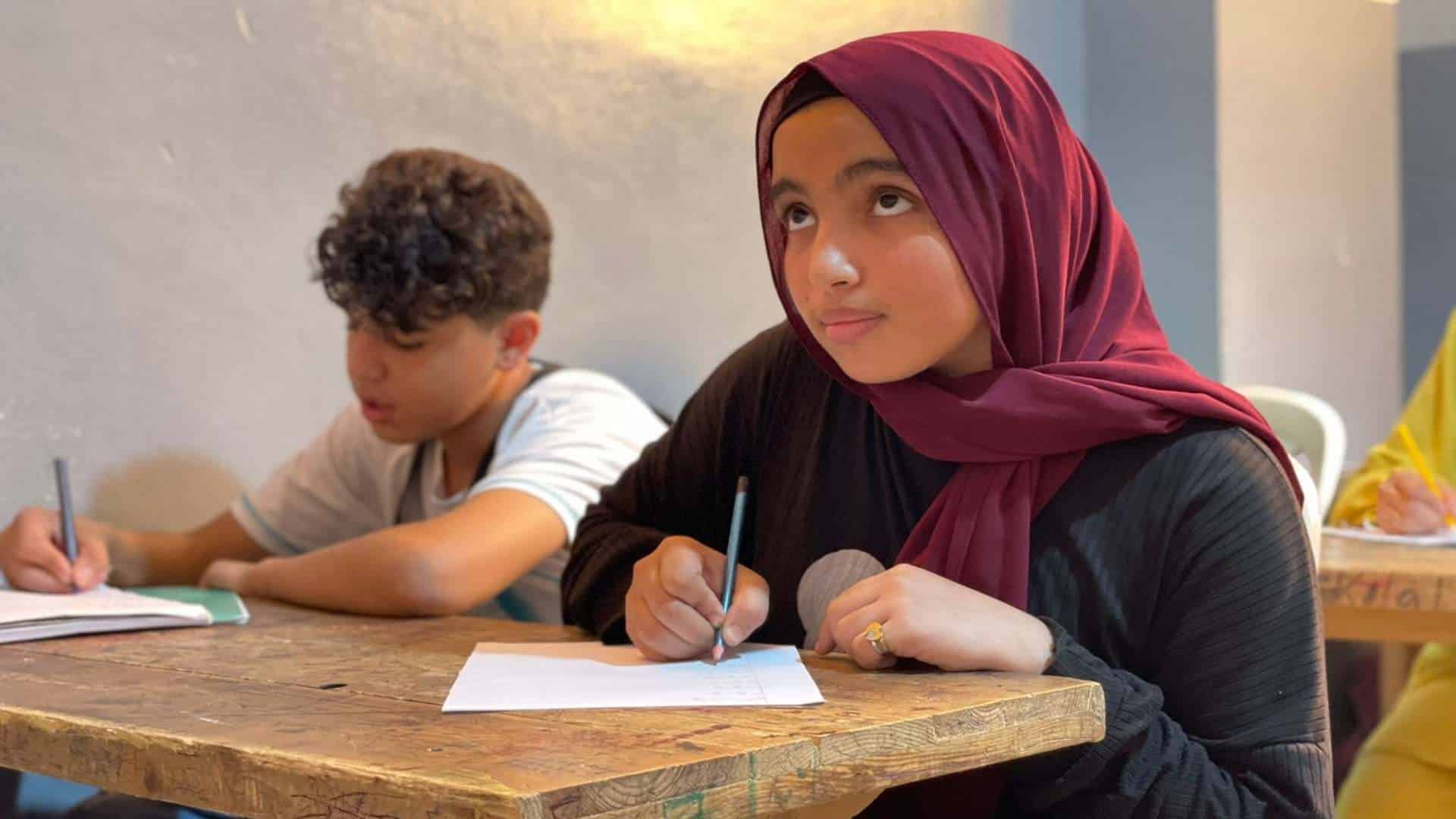Desperate to give daughters a safe life, some refugees marry them off early. One organization in Lebanon is showing girls that there is an alternative.

Batoul, age 13, in an Alsama classroom in Lebanon. Batoul came to Alsama two years ago illiterate because her parents had not allowed her to be educated. One year after joining Alsama she reached A2 level English. (Photo courtesy of Alsama)
This article was produced exclusively for News Decoder’s global news service. It is through articles like this that News Decoder strives to provide context to complex global events and issues and teach global awareness through the lens of journalism. Learn how you can incorporate our resources and services into your classroom or educational program.
Syrians suffering economic distress are pushing their daughters into child marriage. Secondary education offers hope for a brighter future.
At age 14 Ola was bound for child marriage as a Syrian refugee in Lebanon. Facing dire poverty after years as refugees from Syria’s civil war, Ola’s parents saw early marriage as a way to save money and keep their daughters safe. Ola, who couldn’t even write her name in her native Arabic, saw no other future.
“Families get their girls married because they are poor,” Ola said in a Zoom interview from the Shatila refugee camp near Beirut.
“It is also part of Syrian culture and tradition that when a girl becomes 14 years old, they should get married,” Ola said. We are using only Ola’s first name to protect her privacy.
The displacement and poverty of Syrian refugees in Lebanon is driving a startling increase in child marriage. Early marriage existed in Syria before the war. But refugee parents struggling to survive are marrying off their daughters at a rate four times higher, according to a United Nations study.
Girls face a limited future.
Today more than a third of Syrian refugee girls in Lebanon are married before the age of 18. These child brides are deprived of their childhoods and often thrust into motherhood before they are ready. They also suffer high rates of domestic violence, dangerous consequences of pregnancy and childbirth and lifelong economic vulnerability.
But some girls, like Ola, are discovering that education promises a brighter future. Before she could be married, Ola found Alsama, a Lebanon-based non-governmental organization that provides secondary education and classes in female empowerment in Lebanese refugee camps. She convinced her parents to let her attend.
“I was a girl with no knowledge,” Ola said. “But Alsama helped me discover the best that I can be.”
World Bank research shows that improving girls’ educational attainment helps reduce child marriage. It also shows that preventing child marriage can have large social and economic benefits not only for the girls and their future households, but for their entire communities.
Alsama is tackling Syrian child marriage head on. The grass-roots organization provides lessons in Arabic, English, mathematics and computer studies to high school-aged refugees.
Most arrive illiterate and innumerate and many are the first in their families to go to school. Alsama’s first two years of instruction cover the basics of reading, writing and mathematics. In later years, students study science and information technology.
Education provides opportunities.
With 900 students across four schools, Alsama has been able to reduce the rates of child marriage to just one percent of participants. Parents see that their daughters are acquiring skills to become independent and agree to wait for them to get married, said Alsama CEO Meike Ziervogel. The schools have a waiting list of more than 800 students.
“The girls and their families are seeing that there is an alternative path,” Ziervogel said.
The path is not easy. Eliminating child marriage requires changing cultural norms that women should aspire only to marriage and motherhood.
One of the program’s participants, Maram, 17, fled the city of Deir ez-Zor in eastern Syria with her family when it was besieged in 2014 by the Islamic State, also known as ISIS, a transnational jihadist group.
She started to think for the first time about who she was and what she wanted from life, when she learned to write, she said in a short documentary about Alsama.
Without education she would have married at an early age and become a woman without value, she said.
“When you have education, you will have every beautiful thing in the life.”
Showing girls and boys an alternative path
Maram became a strong student and a talented cricket player. But when she earned a scholarship to attend Padworth College in the UK, she knew her parents would not allow her to go.
“Unfortunately, my family don’t know or believe in me that I deserve this chance… because I am a girl,” she said.
Kadria Hussein, Alsama’s Syrian head of education, said that some refugee families feel a sense of shame if their daughters are independent and not married. They worry that their daughters might never marry or that they might be raped and then “ruined” for marriage.
It’s for this reason that Alsama teaches boys as well as girls about the harms of early marriage. The boys and the girls need to collaborate to stop child marriage said Marianna Moukhtara, a management consultant who helps Alsama with their strategy and operations planning. Most of the students’ mothers were married as young teenagers themselves, Moukhtara said. So it is important to change the mindsets of the entire community.
“It’s like a chain that is being changed through the generations,” she said.
Three years have passed since Ola persuaded her parents to let her study and delay her marriage. Now that Ola is earning a salary teaching math at Alsama, her parents are more understanding. They are letting Ola continue with her education. They are asking Ola to teach them to read and write too.
“I want to be a strong, independent and useful woman,” Ola said. “I want to help others. When we can collaborate with each other we will have peace throughout the world.”
questions to consider:
- Why does child marriage persist in places like Syria and Lebanon?
- How can education provide an alternative to early marriage?
- Is there a pressure in your culture to marry young or is there a stigma against that?

Katharine Lake Berz is a freelance journalist who writes about how national and international issues impact people. Her work has appeared in the Toronto Star, The Globe and Mail, CBC, Broadview, The Canadian Press, TVO, National Post, the Walrus and News Decoder. Before becoming a journalist, Katharine was a consultant at McKinsey & Company. She holds a Bachelor of Commerce from Queen’s University in Kingston, Ontario, and a Master of Philosophy in International Relations from Cambridge University.
